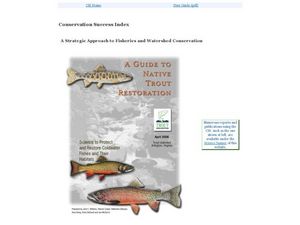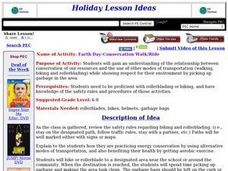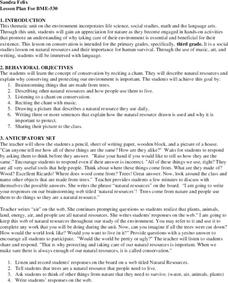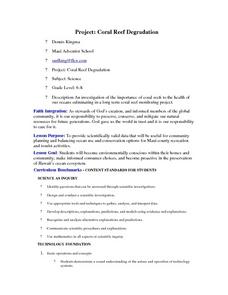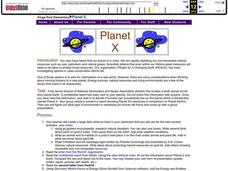Curated OER
Conservation Success Index
Students read information about trout habitat preservation and visit the various links to learn a fish species and its current habitat range. In this habitat conservation lesson plan, students read passages about use the Trout Unlimited...
Curated OER
Outdoor Education
Students participate in various outdoor activities to teach them about the environment. In this outdoor education lesson plan, students participate in activities such as compass direction, conservation, forestry, wildlife, and...
Curated OER
Using the Land
In this land instructional activity, students review the different ways that land is used such as landfills, topsoil, farmland, and hazardous waste. This instructional activity has 13 true or false questions and 1 short answer question.
Curated OER
How Can Humans Change Ecosystems?
In this ecosystems worksheet, students complete a graphic organizer by writing in 2 facts and 1 conclusion about how humans change ecosystems.
Curated OER
What Threatens the Survival of Species?
In this species survival worksheet, students brainstorm different examples of what threatens the survival of species. This worksheet is a graphic organizer.
Curated OER
Where to shop?
Pupils study a topic of an environmental nature that is relevant to them (as individuals) on a local level, but with global implications. They consider whether their family's shopping habits have any lasting effects on the environment.
Curated OER
Grow Your Own
Students study the growth and care of plants. They take tour of their school site and plant seeds to observe their growth. Afterward, they answer questions about the origin and value of their plants.
Curated OER
Who Deserves The Water
Students engage in a variety of lessons that are targeted towards bringing resources to the class in order to motivate the research and writing process. They conduct research using resources and focusing upon the topic water usage and...
Curated OER
Watt's Up with the Electricity Bill?
Students study of how much electricity is used in their home and the actual cost for the electricity. They create a realistic conservation plan for their home focusing on the areas that tend to use a great deal of electricity....
Curated OER
Earth Day-Conservation Walk/Ride
Students explore the relationship between conservation of our resources and the use of other modes of transportation (walking, biking and roller blading). They show respect for their environment by picking up garbage in the area. They...
Curated OER
Conserving Marine Life
Pupils discuss the different threats to various marine life. Through research, groups examine threats to specific marine life, evaluate the situation, and develop possible solutions to help marine life regain stability. Conservation...
Curated OER
Soil Conservation and the EU
Third graders examine how the European Union countries conserve their soil. In groups, they describe ways in which humans can destroy soil and create a plan in which they can be involved to conserve soil in their community. They make...
Curated OER
Collecting S.O.C.K.S
Students participate in the Collection S.O.C.K.S program to protect their local watersheds. Using the socks, they plant new plants and trees around the watershed in order to protect it for future use. They also perform in a skit that...
Curated OER
Conservation
Third graders examine the concept of conservation by brainstorming things that are made from trees and then describe other natural resources and how people use them to live. They listen to a chant on conservation and recite it to music.
Curated OER
Renewing Our Position
Young scholars engage in a lesson in order to analyze the energy needs of the United States and cover the possible future needs depending on the growth of technology. They cover the alternative energy sources and make presentations of...
Curated OER
Wat-er We Good For?
Fifth graders investigate the use of water as a resource that needs to be conserved. They practice the skill of water conservation by taking a home survey of water usage and modify the use in order to decrease the wasting of water.
Curated OER
Coarl Reef Degradation
Students explore methods of preserving Hawaii's ocean ecosystem. Using underwater cameras, students take pictures of the underwater reef. They perform activities to determine the history and degradation of the coal reef. While...
Curated OER
Water Management
High schoolers investigate the plan of a community water management plan. They are given the roles of community members who are involved in a meeting to discuss the development of a plan to conserve water and preserve resources of water.
Curated OER
Our Landfill Future
Students use the internet to research articles on garbage, landfills and the environment. In groups, they identify ways to conserve or recycle materials found in landfills and determine the future of a local landfill. They share their...
Curated OER
Fighting Conservation Crime
Students identify and interpret the evolution and sources of law in Canada. Students compare and contrast the legal rights and responsibilities of individuals, groups, and organizations in Canadian society. Students write a one-page...
Curated OER
Water Conservation
First graders participate in a simulation in which they discover the community has been using too much water. In groups, they research the various ways the water is being used and create a home survey. They show the water usage of the...
Curated OER
Planet X
Students select a wide variety of presentation methods to compare Planet X and Earth. Students share these with their classmates. Students select other methods to present their ideas about a livable planet for human life forms. ...
Curated OER
Earth: the Apple of Our Eye
Students dissect an apple to model the percentage of land on Earth that can be used as a food-producing resource. They use fractions to determine the habitable and agriculture area of the apple.
Curated OER
Green Space in the City
High schoolers identify the different kinds and uses of green space that exist in an urban area. They create maps of local parks and research the history of each park. They conduct a survey of residents near the park and interview a park...


